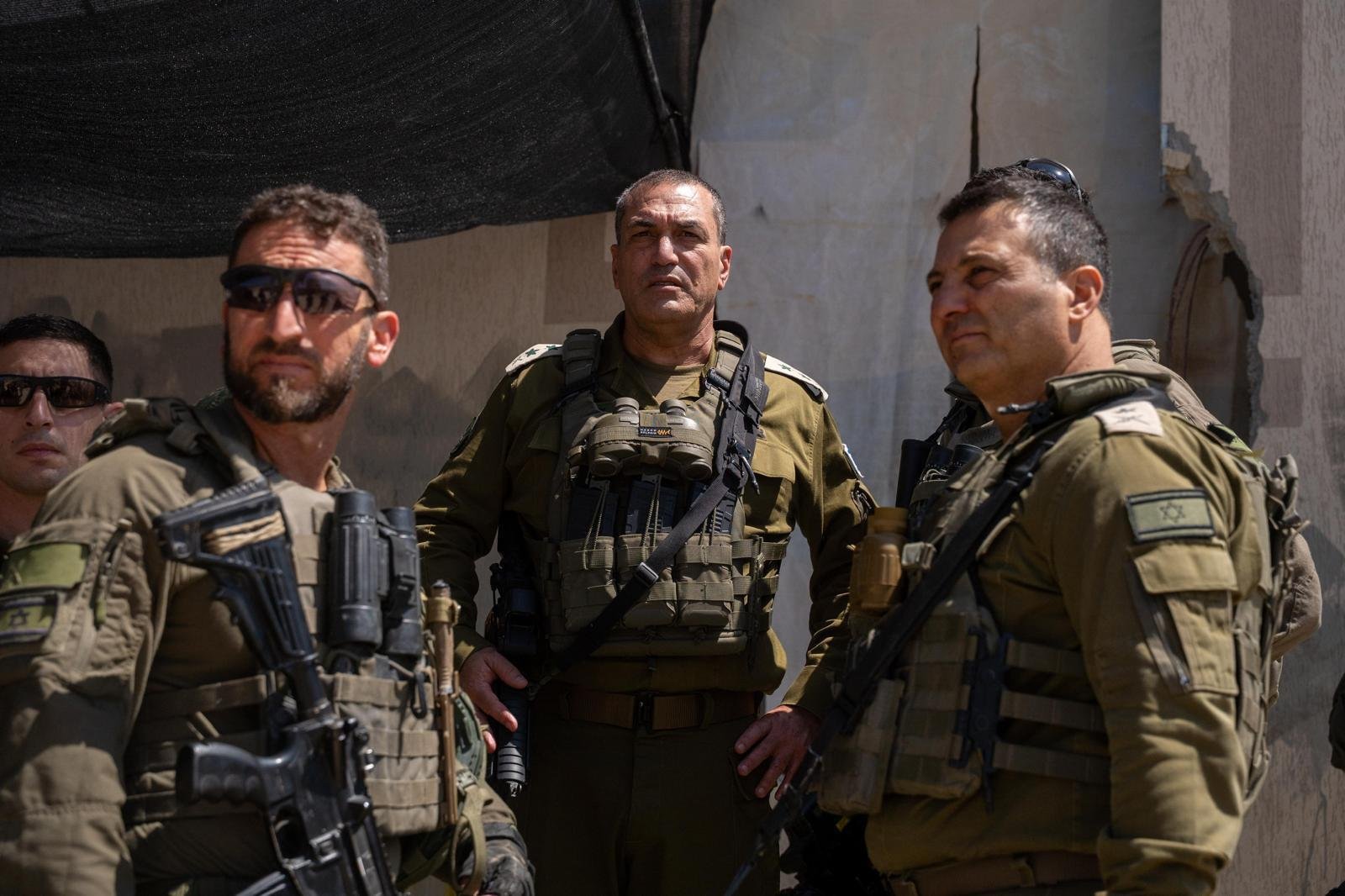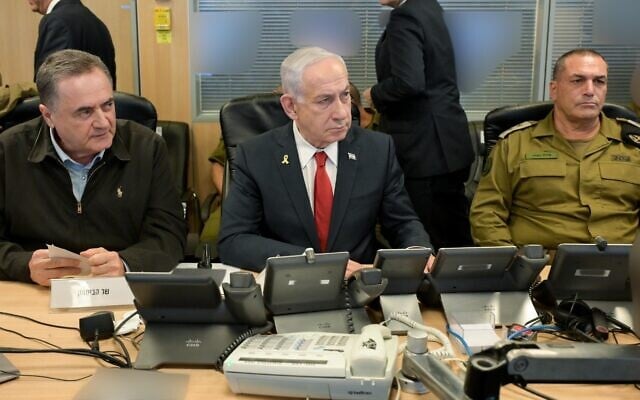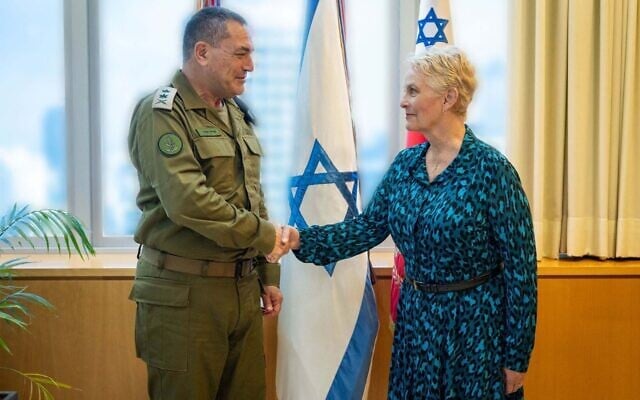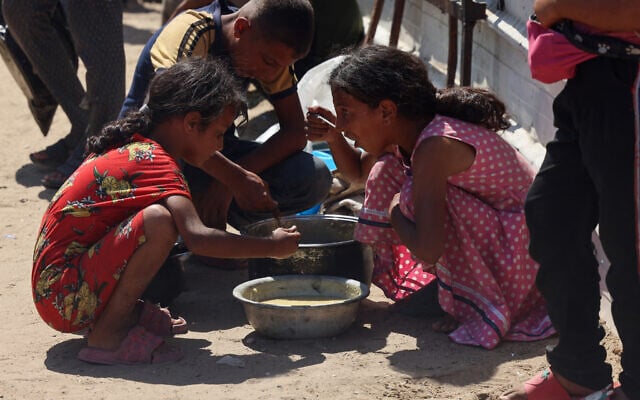



Touring Gaza on Wednesday, IDF Chief of Staff Lt. Gen. Eyal Zamir said Israel’s security is dependent on broad national participation in the military, in comments seemingly aimed at members of the ultra-Orthodox community evading mandatory conscription — and the government working to pass such exemptions into law.
The remarks were made after Prime Minister Benjamin Netanyahu reportedly reprimanded Zamir for making comments contradicting the government’s approach on a number of issues related to the military.
“We cannot accept a situation in which not all parts of society bear the burden,” Zamir said while touring Gaza, according to an IDF readout. “Israel’s security requires the full partnership of all segments of the people… this is the order of the hour, and we must all answer it.”
The military has repeatedly stated it is facing a shortage of about 12,000 soldiers, including 7,000 combat troops, even as it finalizes plans to expand operations and conquer Gaza City, which will involve calling up some 60,000 reservists already fatigued by nearly two years of war.
About 80,000 Haredi men between the ages of 18 and 24 are eligible for service, but have not enlisted and ultra-Orthodox leaders remain fiercely opposed to efforts to end exemptions from service that the community has enjoyed in the past.
Zamir said during the tour that the IDF’s central focus “at this time is deepening the operation in Gaza City,” while reiterating commitments to bring home the hostages, defeat Hamas and prevent a repeat of the October 7 massacre.
“We are in a multi-front campaign and are operating powerfully on all fronts,” Zamir said, stressing that the military is prepared to act again wherever required.
Praising reservists whose call-ups were recently extended, Zamir said their sacrifice was “an inspiration to us all,” adding that conscripts, career soldiers and reservists together embody “the deepest expression of Israeli solidarity.”
According to a Channel 12 report on Wednesday evening, Netanyahu slammed Zamir in a closed-door meeting a day earlier, accusing him of undermining the government and contradicting the messaging issued by the political echelon.
Netanyahu and Zamir reportedly met ahead of the cabinet meeting Tuesday evening, with the prime minister reprimanding the IDF chief for expressing disapproval of some of the decisions made by the government on military matters.
Netanyahu reportedly told Zamir to “stop briefing [the press] against me.”
Publicly, Zamir has backed Netanyahu’s plans to invade and conquer Gaza City, although most Hebrew media outlets have carried statements attributed to him criticizing the plan, suggesting that it will endanger the hostages and that Israel should instead focus its efforts on reaching a ceasefire deal with Hamas.
Zamir — who took office in March — has publicly and privately clashed with government ministers in recent weeks. While he has moved ahead with plans to conquer Gaza City, he said Sunday that military pressure has “created the conditions for the release of the hostages,” reportedly adding that “there is a [hostage] deal on the table, we need to take it.”
After touring Gaza on Wednesday, Zamir also met with UN World Food Program executive director Cindy McCain to review ongoing humanitarian aid efforts in the Gaza Strip.
The meeting, attended by Maj. Gen. Ghassan Alian, the head of COGAT, the Israeli body that coordinates with assistance providers in Gaza, outlined key measures to stabilize the Strip’s humanitarian situation and emphasized ensuring aid reaches civilians directly, not Hamas, the IDF said.
The meeting came days after the WFP-linked Integrated Food Security Phase Classification declared famine in northern Gaza for the first time — a claim Israel swiftly rejected, accusing the report of relying on “biased and self-interested sources originating from Hamas.”
McCain, who has been an outspoken critic of Israeli aid restrictions, claimed in May 2024 that the Strip was already in “full-blown famine.” She said last week hunger in the Strip was at “catastrophic” levels.
The IDF said Wednesday that two new aid distribution centers run by the US-based Gaza Humanitarian Foundation will be completed in the coming days in southern Gaza, while a facility in Rafah’s Tel Sultan neighborhood will close. Once completed, the total number of GHF centers in the Strip will rise from four to five.
According to GHF, which hands out boxes of dried, uncooked food, its centers have distributed more than 140 million meals in Gaza since operations began, including over 1.5 million meals delivered on Wednesday alone.
As the IDF moves ahead with its plans to conquer Gaza City, it has called on the area’s residents to evacuate and head south, saying that it is working to improve the infrastructure in those areas of Gaza to accept more displaced Palestinians.
Aid agencies, including WFP, have said that GHF operations are not enough to distribute food to the starving Gazan population, and have criticized the organization for its operations, including the large number of people said by Hamas-affiliated health agencies to have been killed near or on the way to the distribution sites.
The IPC report issued last week asserted that Israel’s total blockade on aid from early March to mid-May — which came after the collapse of a ceasefire with Hamas — was followed by “critically low volumes through July” and “coupled with the collapse of local food production,” leading to “extreme food shortages.”
Israel resumed the supply of aid in May, but the flow remained well below what it had been prior to the blockade; it was only in July, after reports of imminent famine, that Israel announced a series of actions to boost the flow of aid into Gaza, while denying there was starvation in the enclave.
Israel has accused aid agencies of failing to distribute trucks of food piling up on the Gaza side of the border and asserted that Hamas loots aid shipments, preventing them from reaching those in need.
Times of Israel staff and agencies contributed to this report.



